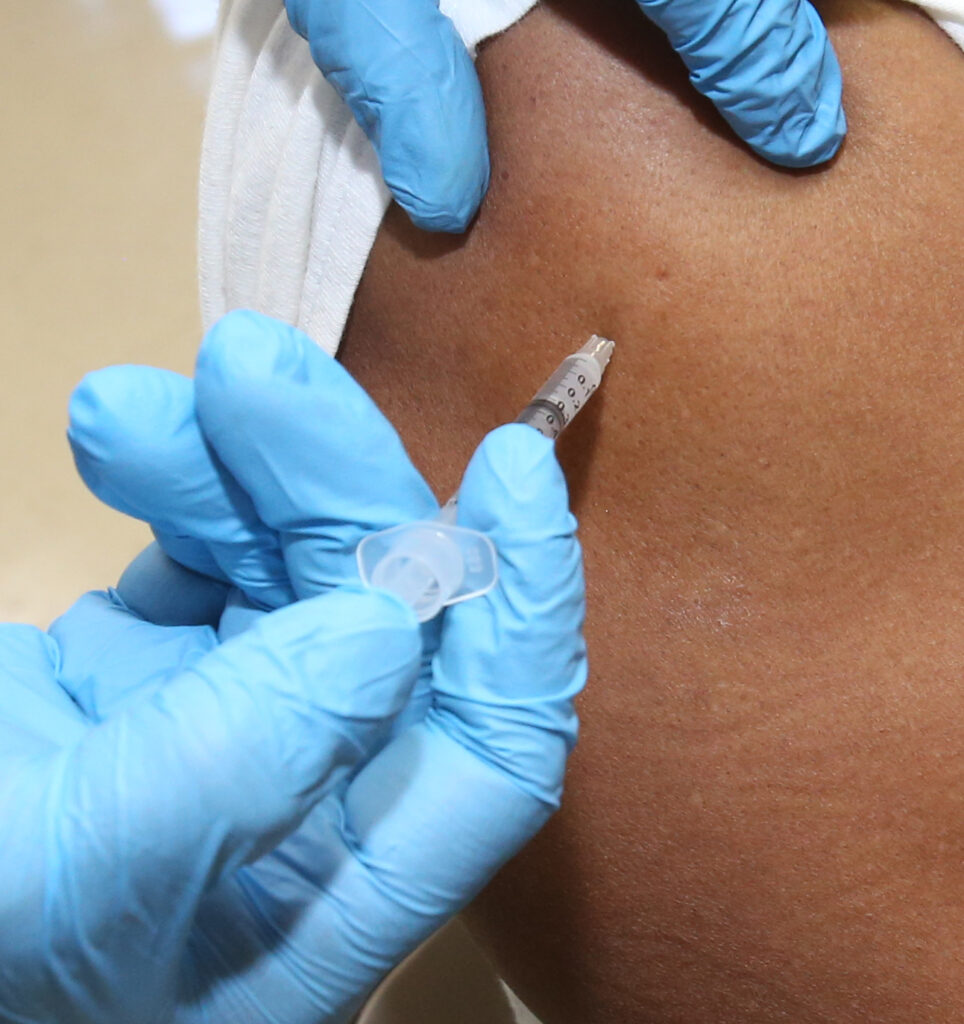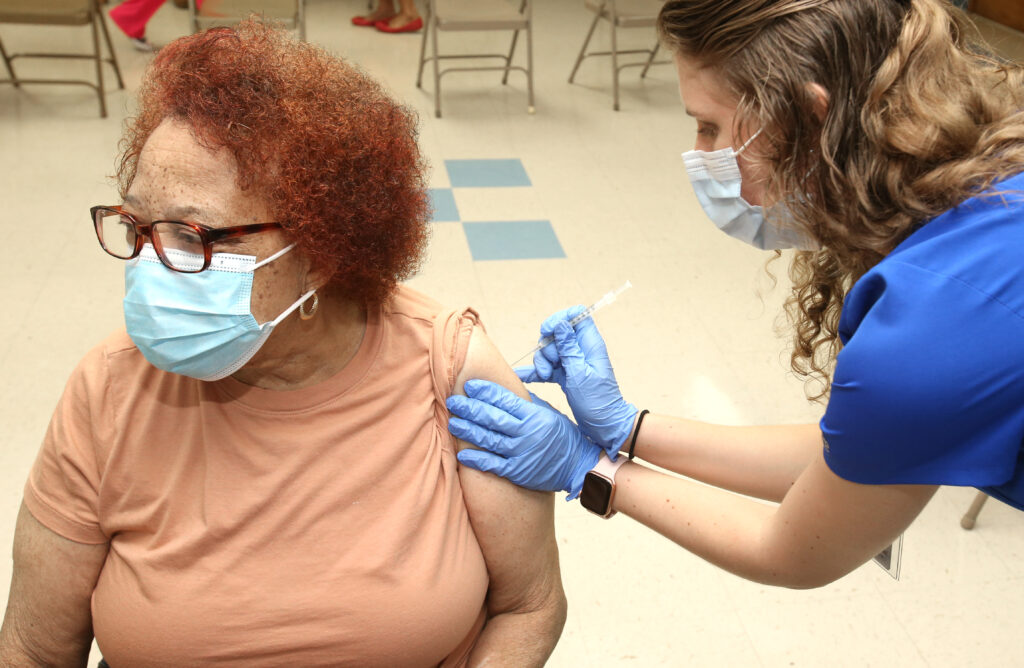Race and COVID

A resident receives their second COVID-19 vaccination from a member of Ocala Fire Rescue during a COVID-19 vaccination clinic at the New St. John Baptist Church on Northwest Second Street in Ocala, Fla. on Wednesday, Feb. 10, 2021. [Bruce Ackerman/Ocala Gazette] 2021.
As Marion County continues to ramp up its vaccination efforts, there are still obstacles to overcome. For one, there’s just not enough doses to go around. But there’s another, much more complicated problem: How do you reach out to a community that has historically felt burned by the healthcare system that is supposed to help them?

Katlyn McNeal, a registered nurse from the Heart of Florida Health Center, right, gives Rebecca McCants her second dose of the Pfizer COVID-19 vaccine during a COVID-19 vaccination clinic at the New St. John Baptist Church on Northwest Second Street in Ocala on Feb. 10. [Bruce Ackerman/Ocala Gazette]
In Marion County, 12.9% of the population is Black or African-American, according to the U.S. Census Bureau’s 2019 five-year American Community Survey estimates. However, Black residents make up just 3.8% of all vaccinations in the county. Of the 25,716 reported local cases through Wednesday, 3,608 were Black. That more than 14% of cases.
“In addition to the opportunity to register for vaccines, Marion County’s plan includes reaching out to specific minority populations to identify areas where vaccinations can occur once they become available,” Florida Department of Health in Marion County administrator Mark Lander said in an email. “Consideration is given for populations where access may be limited due to technology or transportation and other socioeconomic factors. This has already begun as the Health Department partnered with Heart of Florida to provide vaccinations in one of our minority populations.”
The county opting for a registration-based system for the vaccine has succeeded in preventing images of throngs of senior citizens camping outside in the cold for a chance at securing a vaccine as seen in other areas of the state. However, for a community that historically hasn’t trusted the healthcare system, it’s not easy to jump at the opportunity, especially as slots fill up almost instantly.
Distrust in the medical field from the Black community has a lengthy history rife with bias and racism.
The Tuskegee Syphilis Study was an experiment on studying the effect of untreated syphilis on 600 African-American men conducted by the Centers for Disease Control and the US Public Health Service. Of the 600 men, 399 had syphilis, were never treated for it and never knew about their diagnosis, all while being promised free health care. The experiment ran from 1932 to 1972, and the wounds are still fresh today.
And that’s just one of many examples of how African-Americans have been burned by the healthcare system.
“That distrust still runs deep,” Jamie Ulmer, CEO of Heart of Florida, said. “Because of what happened with the Tuskegee experiments and other instances you have that constant struggle to overcome a mistrust of the government. You have to have people from that community also spearhead the effort.”
Still, there are plenty of Black residents in Ocala that are willing to receive the vaccine. Imogene James, 67, said that she didn’t hesitate when it came to getting a needle in her arm.
“I think it’s the best thing for everybody to go ahead and be vaccinated if you can,” James said. “I think once they see that the majority of people are on board with it, they would get on board.”
One of the ways that Florida’s Division of Emergency Management has reached out to the African-American community is through pastors. New St. John Baptist Church was used as a site for second doses on Wednesday and was previously utilized as a vaccination site in January.
Eric Cummings, a pastor at New Zion Missionary Baptist Church who was helping at New St. John Baptist Church on Wednesday, also said that he would receive the vaccine as soon as it was available to him.
“We’re in the midst of the pandemic, and I don’t want to get sick – again,” he said. “So, we know that the only way we’re going to get through this and get to a better time and get some type of community immunity is to get the vaccination.”

A resident receives their second COVID-19 vaccination from a member of Ocala Fire Rescue during a COVID-19 vaccination clinic at the New St. John Baptist Church on Northwest Second Street in Ocala on Feb. 10. [Bruce Ackerman/Ocala Gazette]
However, Cummings said that there is still distrust among the African-American community, and even those who want the vaccine are having a hard time getting on a list.
“It’s been up and down,” Cummings said. “There’s some that has a lot of distrust about past practices, but then, as you can see, you got a lot of people that are wanting it, and there’s a lot of people who want to get it, but they can’t get on a list. So, as availability comes with the vaccine, we hope that they’ll be able to get on these lists and get vaccinated quickly, especially the elderly population.”
The underlying hesitance, however, is something healthcare providers continue to work through.
“We recognize there is hesitancy and challenges related to access to the COVID-19 vaccine in the African American community,” AdventHealth said in a statement via email. “AdventHealth has created a vaccine hesitancy task force which focuses on closing the gap on access to care and ensuring the community has the scientific information to empower their decision process.
“We are currently developing community strategies, and we’re keeping African American and Hispanic communities top of mind as they may be hesitant due to the seeds of mistrust from historical offenses against both communities – roots that manifest in how COVID-19 disproportionately affects these communities today. AdventHealth is committed to educating the community and finding solutions to make it easy for communities to get the trusted care they need. We continue to encourage everyone to get the vaccine when they are eligible to help limit the spread and lower the severity of the virus.”






